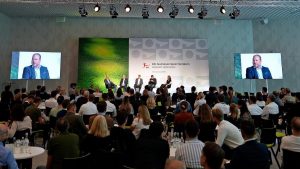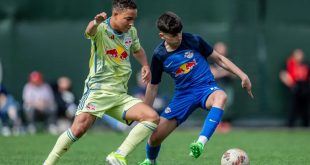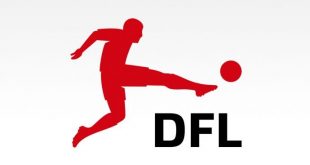 At the second “DFL Sustainability Forum”, the DFL Deutsche Fußball Liga welcomed more than 200 delegates from politics, business, science, society and sports, as well as representatives from the Bundesliga and Bundesliga 2 clubs. Following the successful premiere last year, the Futurium in Berlin was once again the venue to share thoughts on the issue of sustainability in and through football. The forum is one of the components with which the DFL and the clubs are continuing on their path towards a more sustainable future and raising awareness for more sustainability.
At the second “DFL Sustainability Forum”, the DFL Deutsche Fußball Liga welcomed more than 200 delegates from politics, business, science, society and sports, as well as representatives from the Bundesliga and Bundesliga 2 clubs. Following the successful premiere last year, the Futurium in Berlin was once again the venue to share thoughts on the issue of sustainability in and through football. The forum is one of the components with which the DFL and the clubs are continuing on their path towards a more sustainable future and raising awareness for more sustainability.
While the first “DFL Sustainability Forum” last year was all about the kick-off, this year’s event provided an opportunity to go deeper into core issues and to continue the discussion with specialists from a variety of fields. A number of experts presented corresponding ideas – above all on the role and importance of German football in areas such as mobility, economy and diversity.
The opening and welcoming was done by DFL CEOs Dr Marc Lenz and Dr Steffen Merkel, and by Marika Bernhard, Head of Sustainability at the DFL. Together, they set out the framework of the efforts conducted by the DFL and the clubs in the field of sustainability. The central message was that the DFL and the clubs will continue working together so that German football can keep on developing positively and responsibly, while providing positive stimulus for society.
DFL joins UN initiative “Football for the Goals”
During the opening, it was announced that the DFL is now a member of the United Nations’ “Football for the Goals” initiative. The DFL has thus declared its commitment to act for achieving the UN’s Sustainable Development Goals (SDGs). The 17 SDGs are global goals for sustainable development, which have already been incorporated into the DFL’s sustainability guidelines.
This was followed by a panel discussion on “Sustainability in Sport – Necessity or Luxury?” with Charly Classen (Executive Vice President – Sports at Sky Germany), Olivia Henke (member of the Board of Directors of the Foundation Development and Climate Alliance), Anne-Kathrin Laufmann (Managing Director of Sport & Sustainability for SV Werder Bremen), Christiane Reppe (Paralympic gold medallist, paracycling) and Thomas Röhler (Olympic gold medallist, javelin). Laufmann, who is also a member of the DFL’s Sustainability Commission, then remained on stage to talk about sustainability in and through football with Marika Bernhard and scientist Prof. Torsten Weber.
Podium discussions with wide range of experts
The podium discussion that followed addressed the question of how sustainability can lead to innovative ideas and opportunities. Participants included Nico Briskorn (Head of Corporate Social Responsibility at VfL Wolfsburg), Ilja Kaenzig (Chairman of VfL Bochum 1848), Marieke Patyna (Chief Strategy, People & Sustainability Officer for Hamburger SV) and Stefan Wagner (Corporate Development at TSG Hoffenheim).
The title of the next debate was “Mobility and the Circular Economy: Transformation as a Team Sport”. Hanno Franke (Head of Marketing and Sustainability at SC Freiburg), Andreas Gehlhaar (Head of Sustainability and Environment for Deutsche Bahn AG), Nora Sophie Griefahn (Executive Managing Director, Cradle to Cradle NGO) and Marcus Sagitz (Head of Marketing, PreZero) discussed how football can use its reach, structures and position in society.
Intensive discussion and bilateral talks
After lunch – a chance to connect in person – the next panel was on “Diversity: Not an Elective, But a Reality and an Opportunity”. The participants were Axel Hellmann (CEO of Eintracht Frankfurt Fußball AG), Katja Kraus (co-founder and Chairwoman of “Fußball kann mehr”) and Stefanie Mirlach (Head of Project Management – Sports at Sky Sport Germany, and a former professional football player).
A content summary and framework was then provided by Prof. Stefan Schaltegger from the University of Lüneburg. Following the conclusion of the official programme on stage, club officers took part in bilateral talks to provide their insights on practical examples under the title #BundesligaWIRKT.
Licensing process subject to sustainability criteria for first time – clear progress
The second “DFL Sustainability Forum” is just one part of German professional football’s commitment to sustainable development. In December 2021, the 36 professional clubs of the Bundesliga and Bundesliga 2 included a clear commitment to three key aspects of sustainability (environmental, social and governance) in the preamble to the statutes of DFL e.V., and also resolved that sustainability criteria should become part of the licensing process. The sustainability guidelines were enshrined by way of resolution of the DFL Members Assembly in May 2022. Since then, the DFL and the clubs have been expanding their structures, taking real action to ensure a lasting effect.
The DFL’s sustainability guidelines were therefore applied for the first time in the licensing process for the 2023-24 season. The reviewed sustainability criteria cover three different areas: “club management and organisation”, “environment and resources” and “stakeholder groups”. These include the requirement to provide evidence of a sustainability strategy and an environmental strategy, annual consumption data and a transport and traffic analysis. In addition, all clubs are implementing a code of conduct for employees, clearly distancing themselves from all forms of discrimination and making a commitment to equality, diversity and inclusion. The audit was performed for the first time by the independent expert organisation DEKRA.
Refinement of licensing process planned for 2024-25 season
The guidelines serve to further enhance all dimensions of sustainability: environmental, social and governance. The criteria are being constantly evaluated and adjusted over time so that the clubs have the opportunity to develop and expand their structures continuously and with a focus on the future.
The planned ongoing refinement of the sustainability guidelines takes into consideration the varying resources and structures currently available to clubs. At the same time, issues that are expected to have the biggest impact will be highlighted moving forward, such as the topic of fan mobility. Independently of this, clubs can also continue to operate in line with their own respective strategies.
In guiding the transformation process, the DFL continues to attach great importance to the development of central support services, in order to ensure smooth implementation of effective action across Bundesliga and Bundesliga 2. Moving forward, this will also mean the integration of dynamic sustainability partners to further support the league and the clubs.
 Arunava about Football A look at football & the world through my eyes!
Arunava about Football A look at football & the world through my eyes!



